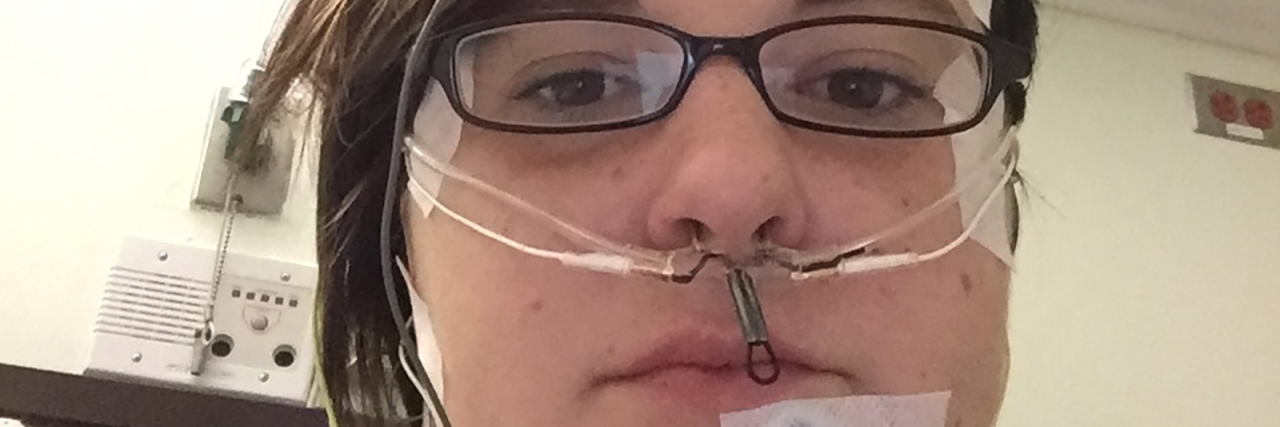The Fight for Disability Benefits When You Have an Invisible Illness
I have fibromyalgia, psoriatic arthritis, asthma, arthritis, PTSD, bipolar disorder and generalized anxiety disorder. These seven conditions are debilitating to me, but no one can see any of them when they look at me.
When you look at me, you see a slightly (well, maybe a little more than slightly — but a girl has to dream, right?) overweight middle-aged woman. Not very attractive — no makeup, no hair blowouts or fancy nails for me. Nope, I look like your average dumpy American mom and housewife. My husband said we were like the parents from the show “The Middle” and I cried (it is so true) because if that were true then I would just be another hardworking American like everyone else, but I’m not.
Instead, what I am is sick. I can’t dress myself, I can’t put my own shoes on, I can’t imagine putting on makeup, let alone doing my hair or nails. The simple fact that I have showered in a day is a marathon test of endurance and amazingness. My husband knows this, my daughter knows this — but no one else does, since they don’t live with me.
I have worked since I was a teenager, so not working right now is very strange to me. I grew sicker and sicker over the years and used FMLA (Family Medical Leave Act) to bolster me, as I had a job where if I called out sick I could be fired, let alone get a chronic illness. I did FMLA for two full years before my company decided to reduce me to hourly instead of salary and cut my pay. The cut in pay was an extra slap in the face to a woman whom they knew had mounting medical bills and was very sick. From where I sit, their goal was glaringly simple: get me to quit since they couldn’t legally fire me.
Well, I’m not a quitter. I worked and worked under the intense stress of my job until I could no longer physically get out of bed and my brain no longer operated correctly for me to be able to even work from home. I was finally out of options after four years of fighting the disease, along with my company’s preconceived notions of what sick people are like. So I had to stop working. Since I could no longer work, I naturally filed for disability benefits.
My husband and I were so relieved — with the disability benefits we could still keep the apartment we had. We could keep our household in pretty much the same lifestyle. We just needed to buckle down until the disability was approved and then everything will be OK. Right? Nope.
I was sent by Social Security to two different doctors for Independent Medical Exams — which I know is typical. One for my physical disabilities and one for my mental. Yes, ladies and gentlemen — I am a dual diagnosis patient — often the least believed of any type of ill person. My psychological exam doctor was great, she said she completely understands why I can’t function on my mental issues alone and she was going to write that down. My physical doctor played it standard and close to the chest.
Guess what — I got my first disability check right after that! Not. I was sent a letter telling me that I do not qualify for disability, as I can stand or sit for hours at a time (umm — no) and that I could lift up to 20 pounds repeatedly throughout a day (umm — no); therefore I am not disabled and can work. Makes a total lot of sense, right?
It has been seven months since I first applied for disability. I have filed an appeal, but that can take up to two or more years before you finally get a date, let alone the appeal. So what is my family doing to survive? Well, we aren’t surviving or thriving really. We are scraping by the edge of our teeth. We have a system down — whomever is going to shut-off whatever thing we need is the one that gets paid that month. It’s a revolving door of final notices and intense stress and fear.
Sadly, the American healthcare and disability programs are broken — the system is damaged beyond repair! Right now, if I wasn’t married to my husband, my 9-year-old and I would be out on the streets since I was denied disability but am unable to work or provide for my child. I wish our lawmakers could listen to and hear these personal stories and pleas for help and make lasting change and help disabled people in limbo like me. Maybe now that I’ve written this they can understand and hear where we are coming from, and do something about it.
We want to hear your story. Become a Mighty contributor here.
Photo provided by contributor.

